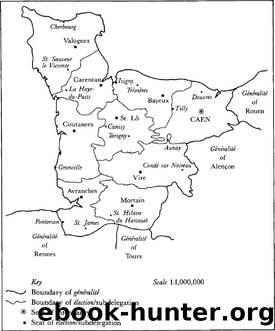Policing the Poor in Eighteenth-Century France by Robert M. Schwartz

Author:Robert M. Schwartz [Schwartz, Robert M.]
Language: eng
Format: epub
Tags: History, Europe, France
ISBN: 9781469639888
Google: x_s4DwAAQBAJ
Publisher: UNC Press Books
Published: 2017-10-10T03:21:15+00:00
The Creation of the Dépôts and the Strengthening of the Maréchaussée
Not long after Laverdy became controller general in 1763 plans for the reorganization of policing were brought to fruition. To assist him Laverdy formed a special committee composed of four councilors of state, including Joly de Fleury; Bertier de Sauvigny served as secretary.7 Planning began in 1764, and by the end of 1767 the first three of the measures recommended by Joly had been implemented and were being executed throughout France. To get to that point the committee moved deliberately but along a circuitous route. From the outset it developed a clear sense of priorities. The state must first take charge of all matters connected with the policing and punishment of vagabonds and sturdy beggars. Then the question of assisting other categories of poor could be taken up and resolved, the committee hoped, through the establishment of alms bureaus to be funded and administered locally in keeping with Jolyâs ideas regarding the sharing of parochial responsibilities.
The first legislation enacted, the royal declaration concerning vagabonds and gens sans aveu of 3 August 1764, was regarded as the first and indispensable part of a broader plan, a preliminary measure and general deterrent that would be strengthened by the setting up of âdépôts provisoiresâ to hold those arrested.8 By the terms of the declaration the penalty of the galleys was reactivated, much as Le Trosne had urged, though the length of the sentence was set at three years. According to article 2, vagabonds were âthose who for six months in succession have carried on neither a profession nor a trade, and who, having no position or property on which to subsist, will be unable to be avowed or to have their respectable character and conduct [bonne vie et moeurs] attested to by persons of dignity and trust.â9 The enemies, then, were masterless men, people of suspect or bad character who were rootless, jobless, and lacked superiors. In fact, the committee felt strongly that vagabonds, gens sans aveu, and mendiants valides were all enemies and that the latter âmerit no compassion.â10 Its intention, therefore, was to have this statute serve in practice for the punishment of any person who fell into one or another of the three categories. With this aim in mind punishment was set at a term of three years rather than life.
The committee turned next to the framing of a comprehensive law on mendicity and soon agreed that its purpose must be threefold: to authorize the creation of the royal dépôts and provide for their administration by the intendantâs, to broaden the judicial authority of the maréchaussée in order to ensure the prompt sentencing of beggars, and to remedy the weaknesses inherent in local systems of poor relief. Among the provisions the committee planned to incorporate in new legislation, the one designed to improve poor relief was particularly noteworthy, because it called for the creation in every parish of a special tax to be paid by all property owners, regardless of their social status.
Download
This site does not store any files on its server. We only index and link to content provided by other sites. Please contact the content providers to delete copyright contents if any and email us, we'll remove relevant links or contents immediately.
Room 212 by Kate Stewart(5105)
The Crown by Robert Lacey(4807)
Endurance: Shackleton's Incredible Voyage by Alfred Lansing(4769)
The Iron Duke by The Iron Duke(4349)
The Rape of Nanking by Iris Chang(4203)
Joan of Arc by Mary Gordon(4101)
Killing England by Bill O'Reilly(3995)
Say Nothing by Patrick Radden Keefe(3975)
I'll Give You the Sun by Jandy Nelson(3428)
Shadow of Night by Deborah Harkness(3360)
Hitler's Monsters by Eric Kurlander(3328)
Mary, Queen of Scots, and the Murder of Lord Darnley by Alison Weir(3202)
Blood and Sand by Alex Von Tunzelmann(3195)
Eleanor & Park by Rainbow Rowell(3153)
Darkest Hour by Anthony McCarten(3119)
Margaret Thatcher: The Autobiography by Thatcher Margaret(3079)
Book of Life by Deborah Harkness(2931)
Red Famine: Stalin's War on Ukraine by Anne Applebaum(2928)
The One Memory of Flora Banks by Emily Barr(2857)
